By Reshat KRIPA
Part two
Memorie.al / Arbër stood in his corner in the hall, waiting for the arrival of the plane that would take him to another world, and he meditated. He meditated and dreamed about the path full of stinging nettles and thorns through which his life had passed. He recalled the worries that had accompanied him for years. He had many passions. He wanted to become a lawyer, journalist, doctor, engineer, artist, writer, or whatever else might be possible. But fate had condemned him not to reach any of his dreamed-of peaks. He encountered disappointment at every step of his life.
Continued from the previous issue
The following year, Arbër and Petrit started the first grade of the seven-year school. They sat together at the same desk. God had gifted them extraordinary intelligence. They immediately grasped the teacher’s explanations and answered right away without thinking. This quickly made them leaders among their classmates. They had a unique nature. They never fought or got into trouble with their friends. Their teacher was Elvira, Petrit’s mother, who treated them the same as all the other students in the class.
Elvira came from an intellectual family that had maintained a neutral stance during the War, not involving themselves with any side. Her father was a cloth merchant who supported his family through his work, which consisted of himself, his wife, and two children: Naim, the eldest, who had studied finance in Italy and worked in the finance directorate of the Executive Committee, and Elvira. From their ancestors, they had inherited a house, where they lived, and a small shop where her father carried out his activity.
It was 1952, the fortieth anniversary of national independence. Andrea thought that, on this occasion, he would stage a patriotic drama from the country’s past with a group of teachers and students. For this, he chose a dramatization of Foqion Postoli’s novel, “Lulja e Kujtimit” (The Flower of Remembrance), which had been staged ten years earlier at the “Nana Skanderbeg” school. He thought that the dramatization should be more impulsive, which, in his opinion, the previous one had lacked.
He thought that the events of that dramatization should fully suit this anniversary. Therefore, it needed reworking. But he was in a dilemma about who to assign the rewriting to. He himself had graduated in mathematics. The school’s literature teachers did not seem suitable. He wanted to discuss it with his wife, Elvira.
The door knocked. “Come in!” he called. The door opened, and Elvira entered. Andrea’s face lit up. “How good that you came,” he told her. “I was thinking of you. I want to discuss an issue.” And he told her about his project, asking for her opinion. Something occurred to Elvira. “I have an idea, but I don’t know if it seems reasonable to you. The most suitable person for that role is Afërdita.” “Afërdita?” “Yes. Do you remember how passionately she recited the poems of great Albanian and foreign authors when explaining them to the students? She looked like a true actress; furthermore, she played this role ten years ago when she was in her final year at the ‘Nana Skanderbeg’ school.”
Silence followed Elvira’s words. A scene from seven years ago appeared before Andrea’s eyes, where Afërdita, on the anniversary of the poet Vaso Pasha, in the midst of a crowd of colleagues, passionately recited:
“From Tivar to Preveza,
Everywhere the sun casts heat and rays,
It is our land; our parents left it to us,
Let no one touch it, or we all die,
We die as the ancient men died
And let us not be shamed before God.”
He lowered his head and remained silent. Elvira was right. “But, will she be able?” “Why are you pondering?” she asked him. “To be or not to be?” Andrea repeated Hamlet’s monologue, without finding the enigma of this problem. “I am in this dilemma too. You understand me.” “Think about it and decide,” Elvira told him.
Andrea was truly facing a dilemma. His character pushed him to accept Elvira’s proposal, but an inner voice told him: “Don’t rush! Delve deeper, consider the case carefully, and then decide! Think about the consequences.” This last thought worried him the most. He recalled the rejection he had received from the people he had talked to about his request for Afërdita to return as a teacher. But another case he had encountered recently also appeared before his eyes. A friend of his, the director of a tailor shop, had appointed a very talented woman, who had finished a tailoring course, to the position of brigade leader of the women’s and men’s shirt department.
With her imagination, she had designed several types of shirts that were highly sought after by the market. But, unfortunately, her brother had been sentenced to ten years in prison for agitation and propaganda. Such a thing had led to the director being dismissed from his post, eventually forcing him to leave the enterprise. Andrea was thinking about these things in those moments. Would he also have the same outcome?
He also discussed the matter with his father. Robert was listening to him attentively, in silence. Finally, he told him: “Listen, son. There are three types of people in the world. The first are those who set a goal for themselves and do not deviate from that principle, naturally when it is reasonable and moral. Whatever circumstance they face, they do not waver from their principles. They want to be commanded only by their will and no one else’s. They want to be guided by their reason and no one else’s. They want to direct themselves, not be directed by others. They want to decide for themselves, not let others decide. In short, they want to be somebody, taking into account any price they have to pay.
The second are the charlatans, hypocrites, sycophants, who are ready to sell their morals for an illegal post or gain. They have no face, no conscience; they have turned into chameleons. Unfortunately, they are found in abundance in today’s world, and with their actions, they prevent life from going its course.
The third types are special compared to the first two. Hatred for every opponent predominates in them, making them egoists, sadists, and criminals. They are willing to use the cruelest means to achieve predetermined goals. They feel pleasure when they see their blood shed. This is the only feeling that dominates their hearts, and this makes them more cynical. So, my son, ask your conscience which group you belong to and act as it tells you.”
He spoke no more, but for Andrea, he had said enough. Andrea decided to act. He sent word to Afërdita to report to the director’s office. Classes were over. Students and teachers had left. Afërdita, as usual, was cleaning the school. She was surprised by this summons. “Why?” she asked herself. When she entered the office and saw that Elvira was also there, she felt relieved. Her shyness was gone.
“Yes, Mr. Director!” she said to him. It was the first time she had addressed him by this title. “Don’t call me Mr. Director anymore. I have a name. We have been colleagues for years.” They stood in silence for a few moments, and then Andrea continued: “You know that the celebration of the fortieth anniversary of the declaration of independence is approaching. On this occasion, together with Elvira, we thought of staging the dramatization of ‘Lulja e Kujtimit’ and we thought you should do the adaptation, and even play the role of Olimbia, as you did ten years ago.”
Afërdita froze. Such a proposal had never crossed her mind. She, a school cleaner, returning to the role of a writer and theater actress. A strange feeling began to overcome her. Her childhood appeared before her eyes, when her main passion was to become a famous actress. She remembered the story when, ten years earlier, the school administration had organized, like now, the staging of the novel ‘Lulja e Kujtimit’, dramatized by a well-known figure.
Afërdita had been given the role of Olimbia. At the end of the show, everyone had warmly applauded the interpretation of the young actress, and the newspapers of the time had even begun to write that she would become a great actress. Later events had changed the course of her life. She, the excellent student of the “Nana Skanderbeg” school, had ended up as a simple school cleaner.
So, she was in a dilemma. One voice told her that she should accept it, as this was the only way to realize her childhood dream of becoming somebody, while the other voice whispered to her that this was impossible because she had to consider the position she was in. “Will you allow me to think about it?” she asked the principal. He did not object, and so they parted.
“Why are you thinking?” her mother asked Afërdita. “Because I am at a crossroads,” was the answer. “And you are unable to solve it?” “I am between two paths, one leads to paradise and the other to hell.” “The road to hell is open, and you can go whenever you want, while to go to paradise, you have to cross ravines and cliffs that require effort and will to pass. Are you, perhaps, lacking this will? Migjeni once wrote:
‘Oh suppressed wills!
Oh crushed wills!
Shake off the wicked shackles!
And with a triumphant cry,
With the impulse of giants, of soaring desires,
Turn in all directions and descend onto the land,
Perhaps there you shall find the beginning of a hymn.'”
“My wills are suppressed; I don’t have the strength to shake them off, as the poet says. What can I do to free myself from this suppression? Can I possibly?” Migjeni wrote: “Shake off the wicked shackles!” “But do I have the power for this?” “Speak, daughter, speak! Tell me where the issue lies.”
Afërdita told her about the school principal’s proposal. She also told her why she hesitated to accept it. She was the wife of a man who died in prison as an enemy of the people, and thus her right to practice her profession had been denied. How would the public receive her appearance on stage?
Her mother remained silent for a few minutes. Finally, she said: “Don’t be afraid, my daughter. Accept the proposal. You played that role a few years ago and were brilliant, even though you were still young. Do you remember how the audience lifted you up? Now you have the chance to show them who you are. Don’t lower your head. No one can break your pride.”
Afërdita decided. The next day, she told Andrea that she accepted. “Long live Afërdita! I assure you that this will be the turning point in your life’s path.” “Do you think so?” “Absolutely. I promise you that you will soon reach the place you deserve!” “Thank you!”
Afërdita returned home and opened the novel. The scenes of it appeared before her eyes. Dimitri, a young man who worked as the chief servant in Mr. Kristo’s shop and loved his only daughter, Olimbia, who also loved him. For this reason, Mr. Kristo, together with his secretary, Niko, made plans to remove him from Korça by handing him over to the Turkish government as a rebellious person who had relations with Albanians outside Albania.
Dimitri, warned by Olimbia, leaves and sets off for Manastir, where he knew many rebels. However, it was a wild winter night, and he encounters a pack of wolves, which tear his horse apart. He himself barely escapes alive, with the help of the rebels of that area who were operating there.
At this time, the news spreads in Korça that Dimitri has been torn apart by wolves. When Olimbia hears this, she despairs so much that she loses her mind and remains like that for sixteen months until one day, the “Flower of Remembrance,” which Dimitri had given her, revives her memories of the past and brings her back to her senses.
This subject appeared before Afërdita’s eyes. It seemed similar to her fate with Sokol. He too had been surrounded by wolves and devoured; furthermore, there was no grave where she could mourn or bring a bouquet of flowers. Instead of the “Flower of Remembrance,” she had the photograph where he was cheering with his hands up.
“Interesting,” Afërdita thought, “even then there were envious people who tried to destroy the dreams of others.” And she recalled the intriguers of the time she lived in. She sat down and began to work. She took the first dramatization and began to reread it. Where she thought the script faltered, she made corrections or additions. She was immersed in the world of fantasy. Nothing existed for her anymore, except the events of the drama. The surrounding environment did not exist. Her mother watched her and tried to speak to her, to pull her out of this state, but in vain. She had lost herself in her world. Finally, she finished it.
The next day, she handed the drama to Andrea. He quickly glanced at it and said: “Thank you, well done! You have created a masterpiece.” Preparations for the show began immediately. Andrea spoke with a well-known director of the city, who took on the staging. The production team, set designers, composers, painters, was also chosen. The performers were also selected. Afërdita took the role of Olimbia, while Dimitri’s role was taken by a young teacher, Skënder, who had come to the school that year. The other roles were assigned from the ranks of the graduating students.
Andrea had only one doubt. Would the secretary Demir allow Afërdita’s presence? He knew his opinion of the cleaner. But fate helped him. Demir had gone for a Party course in the capital. So, the path was open.
Finally, the day of the great celebration arrived. The city buzzed with the cheers of the residents pouring into the streets and the speeches of the authorities, including that of the high representative who had come from the capital. The sounds of the city band covered the noise of the people. In the evening, the performance of the anticipated drama. Crowds headed towards the theater hall, which filled completely.
In the central gallery, the high representative who came from Tirana, the First Secretary of the Party, the Chairman of the Executive Committee, and other cadres. Among them was Demir, who had finished the course. Principal Andrea was also seated in the gallery. Afërdita’s mother and little Arbër had also come to the show.
The show began. On stage, Dimitri and Olimbia, a couple of lovers, who looked like they would devour each other? The audience watched them with admiration. A movement began in the central gallery.
“Who gave her this role?” – Demir addressed Andrea.
The spectators near the gallery turned their heads. The First Secretary motioned for Demir to be silent. Andrea pretended not to hear.
The show continued. The next scene. Mr. Kristo and Secretary Niko plan to hand Dimitri over to the Turkish authorities. Olimbia hears them and begs her father, but he does not relent, so she warns her lover, who leaves the city. Finally, a messenger appears, bringing the grim news: Dimitri has been torn apart by wolves.
A piercing scream is heard. It is Olimbia screaming. The hall awaits the flow of the event, stunned. Her voice booms with her hands rose: “Oh God, where are you?” Memorie.al




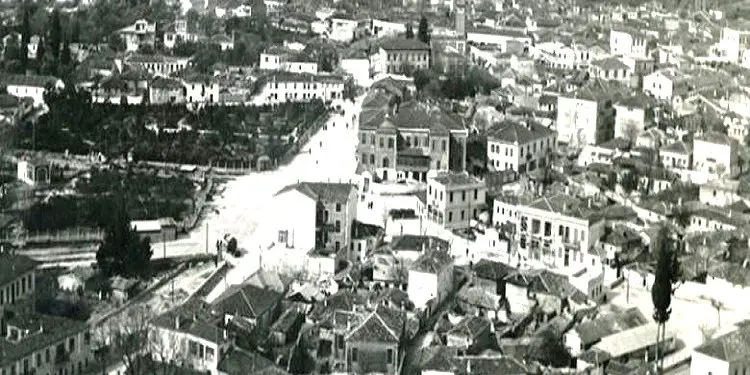
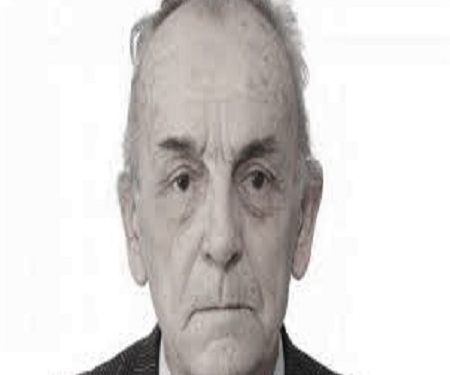
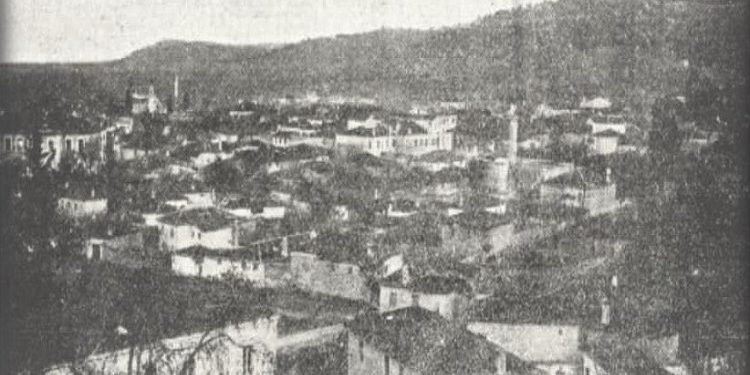
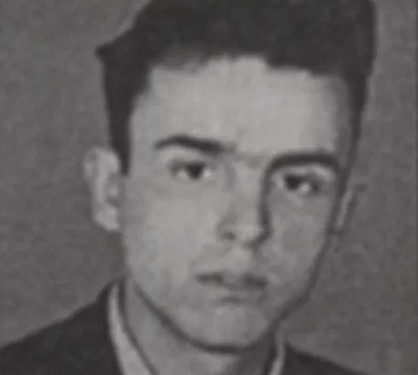
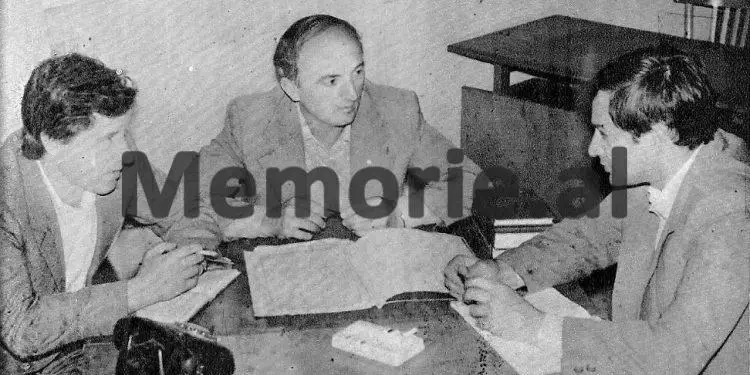
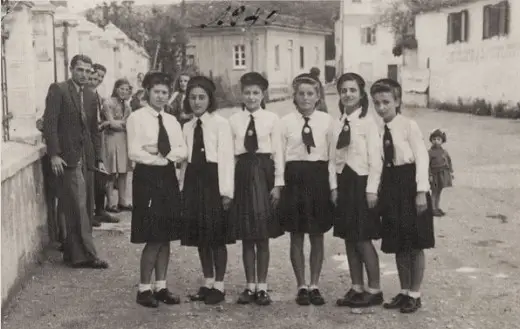






![“His capacity is quite low, he is not clear about the political situation, he only has two grades of school and has never held a book in his hand…”/The State Security document on Sulo Gradeci, Enver [Hoxha]’s escort, is revealed](https://memorie.al/wp-content/uploads/2025/11/Me-Sulo-Gradecin-ne-Dajt-75x75.jpg)